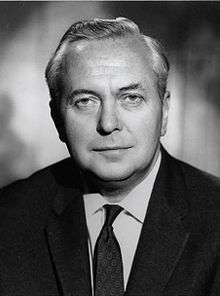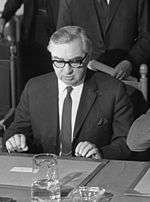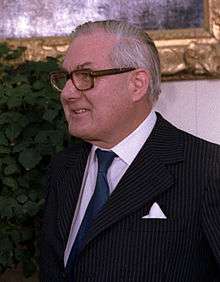Labour Party (UK) leadership election, 1963
Labour Party (UK) leadership election

|
|
|
|
| |
 |
 |
| Candidate |
Harold Wilson |
George Brown |
| First Round Votes |
115 |
88 |
| First Round Percentage |
47.13% |
36.07% |
| Second Round Votes |
144 |
103 |
| Second Round Percentage |
58.30% |
41.70% |
|
| |
 |
|
| Candidate |
James Callaghan |
|
| First Round Votes |
41 |
|
| First Round Percentage |
16.80% |
|
| Second Round Votes |
– |
|
| Second Round Percentage |
– |
|
|
|
|
The British Labour Party leadership election of 1963 was held following the death of Hugh Gaitskell, the party leader since 1955. He had died on 18 January 1963 and was succeeded (on a temporary basis) by the deputy leader George Brown.
In 1963 the Labour leader was elected by the Parliamentary Labour Party (the members of the House of Commons in receipt of the Labour whip). To be elected the winning candidate required more than half the votes. If no candidate was elected in a ballot then the last placed candidate was eliminated and a new ballot held contested by the continuing candidates. This process, known as the exhaustive ballot, was repeated until a candidate was elected.
Candidates
Three candidates were nominated.
- Deputy Leader since 1960, George Brown (born 1914), was the MP for the Derbyshire constituency of Belper from 1945. Brown was popular in the party and stood for the continuation of Gaitskell's policies, but his colleagues were well aware of his propensity to drink excessive amounts of alcohol and behave in an erratic manner. Brown had been a junior minister before 1951.
- Shadow Chancellor of the Exchequer James Callaghan (born 1912), an Englishman who had represented part of the Welsh city of Cardiff since 1945, was a well regarded frontbencher. He sat for Cardiff South East in 1963. Callaghan had been a junior minister before 1951. Callaghan was also a Gaitskellite and his campaign split the vote of the right wing of the party.
- A former Bevanite, Shadow Foreign Secretary Harold Wilson (born 1916), had been the MP for the Lancashire constituencies of Ormskirk 1945-1950 and of Huyton since 1950. He had resigned from the cabinet of Clement Attlee in 1951 on the issue of prescription charges in the National Health Service. Wilson was the most credible alternative leader for the left, so he was persuaded to seek the party leadership in a 1960 challenge to Hugh Gaitskell. In that election he received 81 votes (35.37%). He was the only one of the three leadership candidates with cabinet experience.
Ballots
An overall majority was required for election. The results of the ballots of Labour MPs were as follows:
| 1st Ballot: 7 February 1963 |
| Candidate |
Votes |
% |
|
|
Harold Wilson |
115 |
47.13 |
|
George Brown |
88 |
36.07 |
|
James Callaghan |
41 |
16.80 |
|
| Majority |
27 |
11.07 |
|
| Turnout |
244 |
|
|
Second Ballot required; Callaghan eliminated |
|
| 2nd Ballot: 14 February 1963 |
| Candidate |
Votes |
% |
|
|
Harold Wilson |
144 |
58.30 |
|
George Brown |
103 |
41.70 |
|
| Majority |
41 |
16.60 |
|
| Turnout |
247 |
|
|
Wilson elected |
|
References
- 20th-century British Political Facts 1900-2000, by David Butler and Gareth Butler (Macmillan Press, 8th edition 2000)
- Who's Who of British Members of Parliament, Volume IV 1945-1979, edited by M. Stenton and S. Lees (Harvester Press 1981)
|
|---|
|
|
|
| Internal elections |
|---|
| | Leadership elections | |
|---|
| | Deputy Leadership elections | |
|---|
| | Shadow Cabinet elections | |
|---|
|
|
|
|
|
|---|
|
James Harold Wilson, Baron Wilson of Rievaulx |
|
| Premierships | | |
|---|
|
| General elections | |
|---|
|
| Party elections | |
|---|
|
| Constituencies | |
|---|
|
| Resignation Honours | |
|---|
|
| Family | |
|---|
|
| Related articles | |
|---|
|
-
 Book Book
-
 Category Category
|

